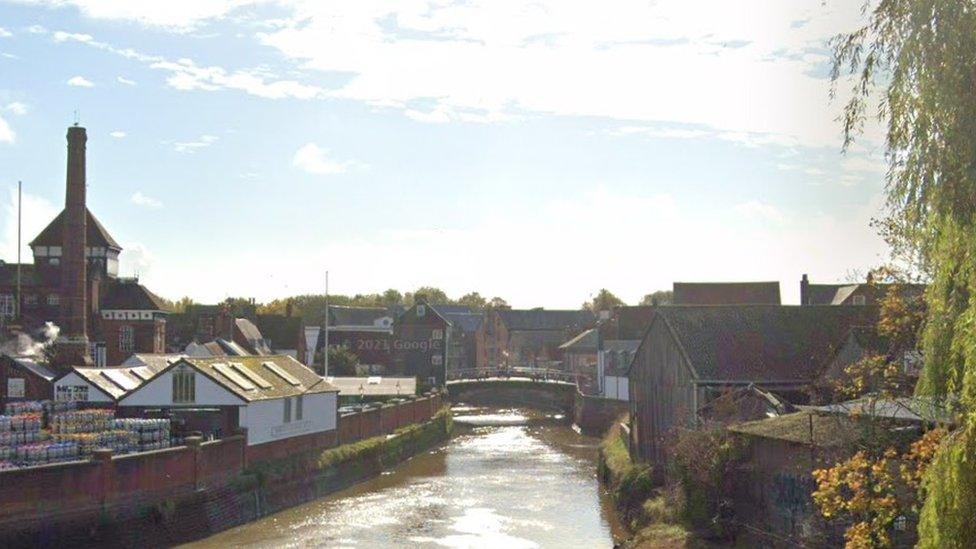'I've fallen ill five times after surfing at sea'
- Published
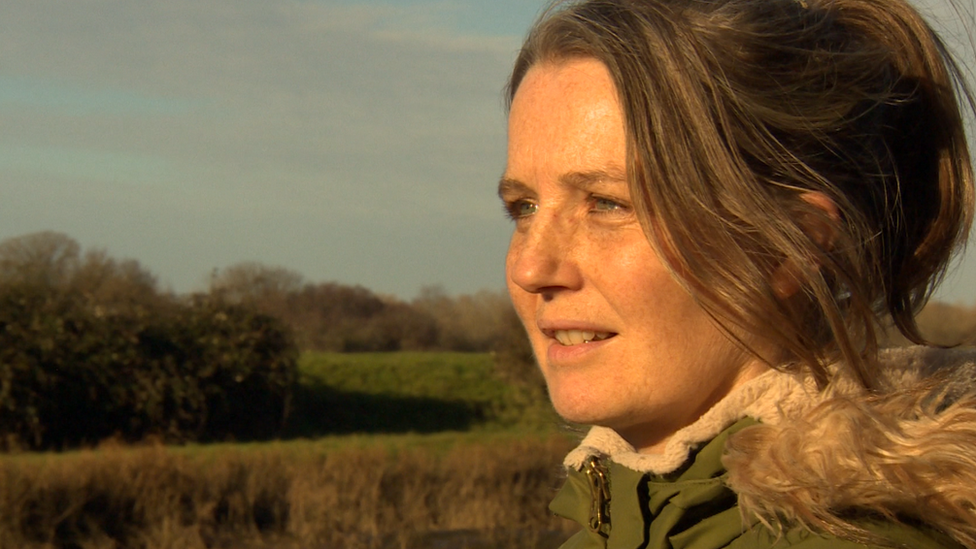
Susan Moate believes repeated ear infections were caused by sewage pollution
More and more people are reporting getting ill after swimming and paddling in rivers and seas. Is sewage making people sick?
Susan Moate's daily dips in the river beside her home have become a vital tool in managing her mental health.
"It's like all the stress has been washed away," she said, jogging on the spot beside the River Ouse, trying to warm up before a swim. "I've come to really rely on it."
Repeated ear infections, however, have left her worried about the impact on her physical health.
What effect was this having on her hearing, the violin teacher wondered. And what would happen if she entered the water with a cut or graze?
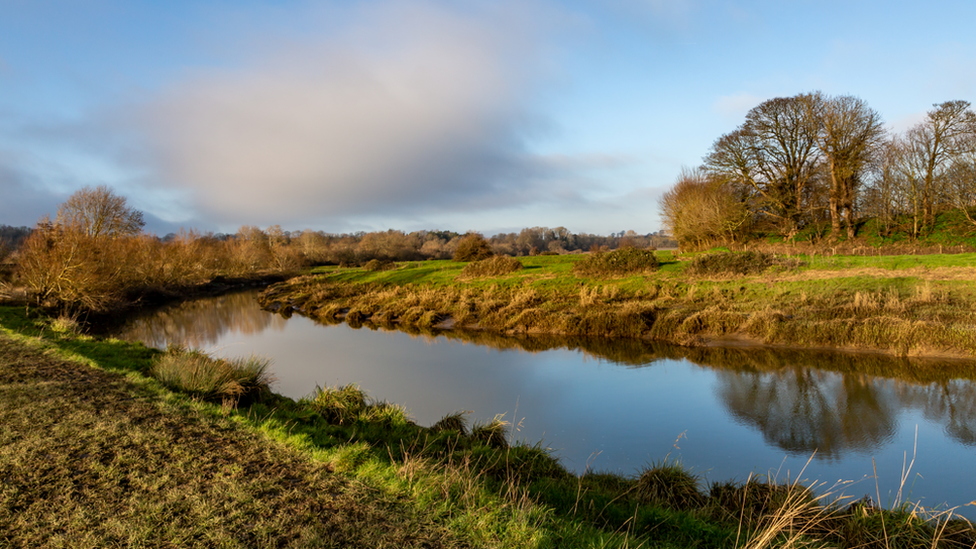
There has been a rise in people falling ill after swimming or surfing
Susan is one of 12 people that told BBC South East they had fallen sick after swimming or paddling in rivers and seas. They all suspect sewage pollution is responsible.
Across the UK, 286 people told the charity Surfers Against Sewage that they fell ill after swimming or surfing this year - up from 153 in 2020.
The rise in reports has come as people turned to pursuits like wild swimming and paddleboarding during the pandemic.
At the same time, there has been a growing awareness of water companies spilling untreated sewage into rivers and seas - a permitted practice to prevent flooding during heavy rain.
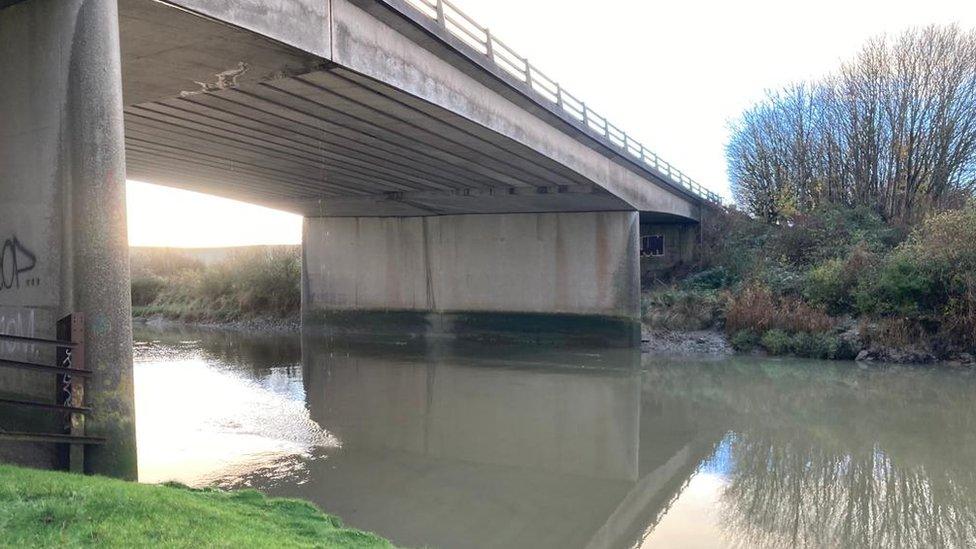
A sewage outlet in the River Ouse spilled for more than 3,500 hours in 2020
Unbeknown to her, Susan's swimming spot in the River Ouse is just a few hundred metres from a sewer overflow pipe.
A mixture of raw sewage and rain water spilled into the river at this site for more than 3,500 hours last year, according to the company's own figures. For one four-month period last winter, it spilled every day.
The BBC collected a water sample nearby in the River Ouse on 9 December. Laboratory tests found high levels of bacteria that demonstrate contamination with human or animal excrement.
Two other waterways near Southern Water sites - one a tributary of the River Medway near Crowborough, East Sussex, and a stream in Hawkhurst, Kent - also had high levels of so-called "faecal indicator" bacteria. A fourth sample from the sea off Bexhill, East Sussex, was negative.
The source of the contamination is unknown. Possible culprits range from agriculture and wildlife to leaking septic tanks or water company sewage spills.
Susan believes sewage is responsible for her infections. And she is not alone.
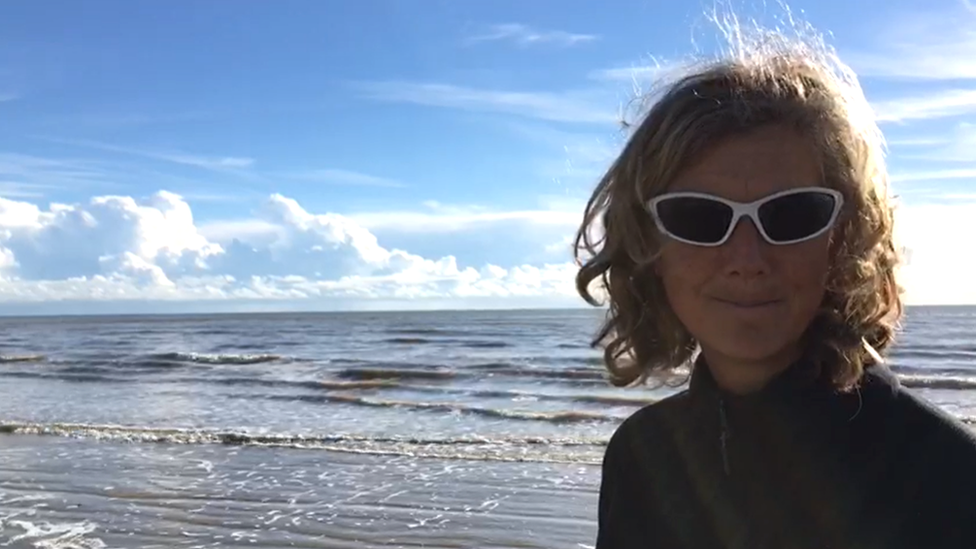
Zoe Steel has fallen ill five times and has stopped surfing after heavy rain
Zoe Steel started vomiting one evening after kite surfing near her home in East Preston, West Sussex. She spent the next six hours hobbling from her bed to the bathroom.
"You just feel horrible," she said. "It gives you the shivers, stomach cramps, aching."
After hours of suffering what felt like "the worst hangover ever" she dialled 111 and a paramedic came to her home. She was sent to A&E and received an injection to stop the vomiting.
It was one of five times she had fallen ill after surfing following heavy rain.
The 57-year-old runs a seaside caravan park and her whole life has been tailored around a love of water sports. But, she now tears up plans to surf if there has been a downpour.
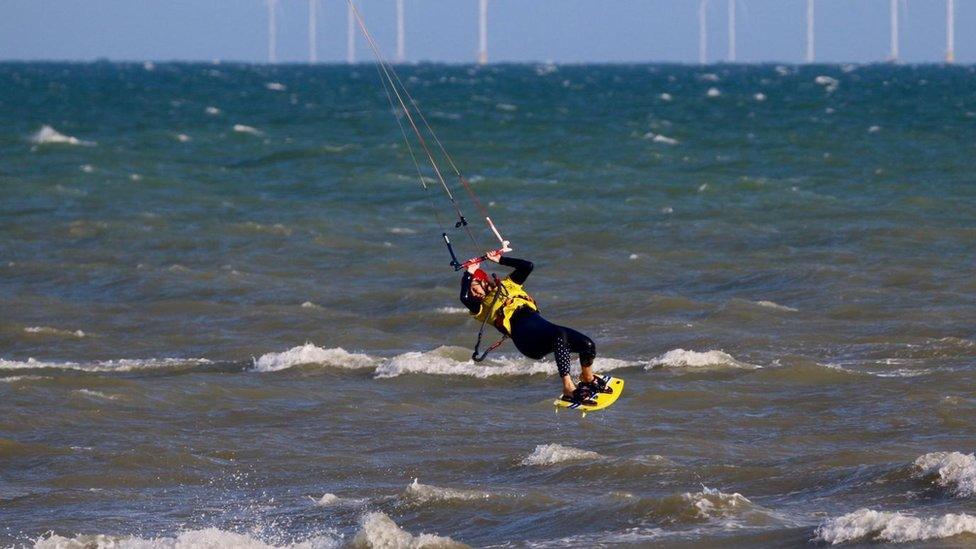
Zoe Steel was taken to hospital after one bout of sicknesses
NHS worker Libby Darling, from Rottingdean, East Sussex, says she became a "complete and utter addict for getting in the sea" during the first lockdown in 2020.
"Every other part of our lives has been affected, but this gave us an opportunity to have a sense of freedom," she said.
"Once you are in the sea you get this kind of silky hug, no matter how warm or cold it is," she added.
It gave an endorphin-hit that could leave a warm afterglow even hours later, she said.
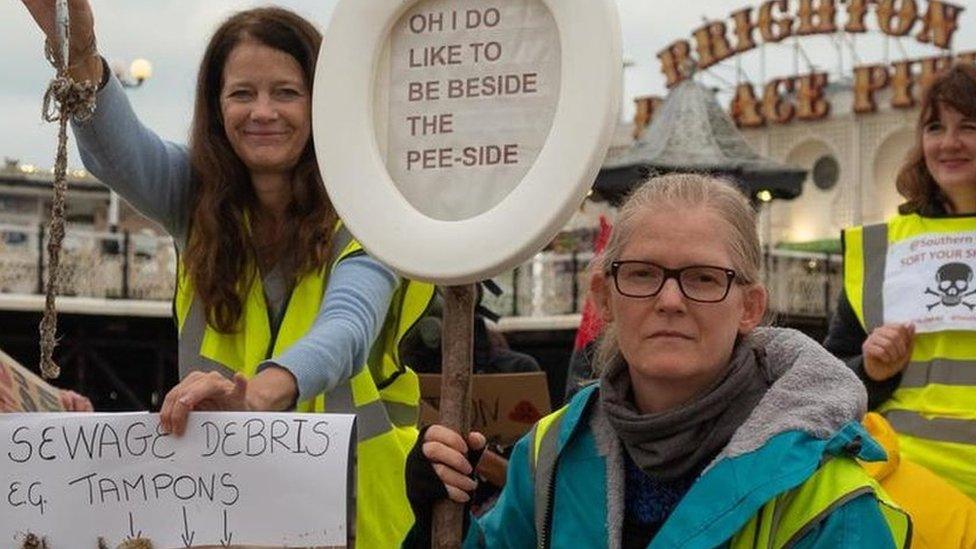
Libby Darling, centre, and fellow swimmers are demanding an end to sewage spills
But since she started swimming regularly, she has twice fallen ill.
She was diagnosed with an inner ear infection, called labyrinthitis, that left her in "horrendous" pain and totally off balance, she said.
"I would be sitting on my office chair and just scrolling through emails made me fall off my chair," she said. "For a few days I wasn't able to function properly."
Later, a stomach bug made her "really, really ill".
The symptoms kicked in shortly after swimming and left her "in bed, unable to stand up".
"Luckily, I have an en suite," she said. "So it's relatively close as I just sat on the loo for hours."
She believes sewage spills are responsible for both bouts of sickness.
Outraged over a string of headlines about Southern Water spills - including a record £90m fine for deliberately dumping waste water from 2010 to 2015 - she joined a local group of swimmers demanding change.
The South Coast Sirens are to begin regular testing of waters off the coast of Sussex next year, having raised £1,600 through crowdfunding.
The group also wants the Environment Agency (EA) to expand its testing.
Under the current regime, samples are taken at 419 sites across the UK, but only during a five-month bathing season of May to September. Only one river - a stretch of the River Wharfe in Yorkshire - is tested by the EA.
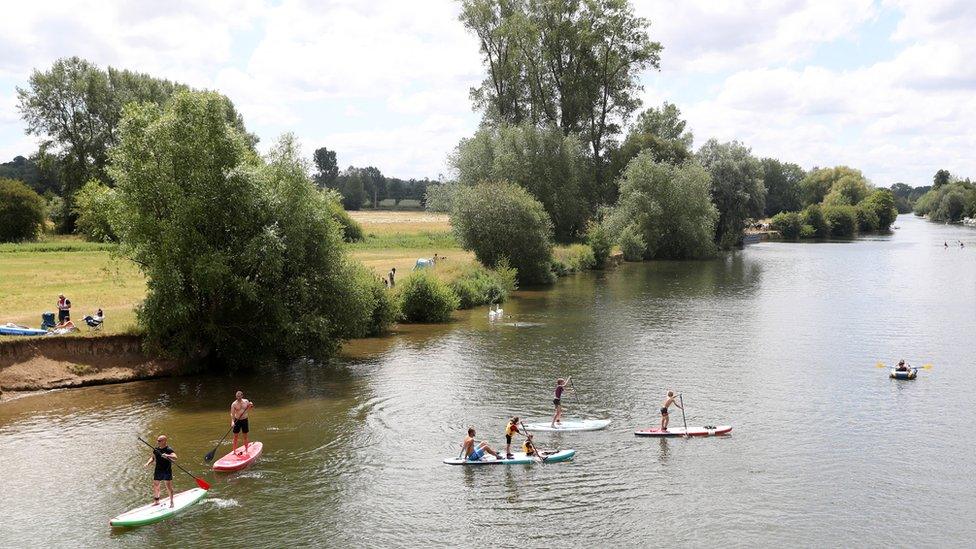
Experts believe the popularity of sports like paddleboarding may account for a rise in sickness reports
James Ebdon, a professor of environmental microbiology at the University of Brighton, says the presence of "faecal indicator" bacteria - E. coil and enterococci - shows that there is an "increased likelihood that pathogens are also likely to be present".
When it comes to answering what was making people sick, he said he "can't see many other causes" other than contamination with human waste.
He believes illness linked to contaminated water has been "hugely under-reported".
The rise in known cases was likely to result from the fact there are "certainly more people, as we've seen during the pandemic, using recreational inland waters".
It could also be the product of growing awareness of spills, he said.
"The high profile issues we've seen in the news in recent months has got people to come forward and report some of these illnesses," he added.
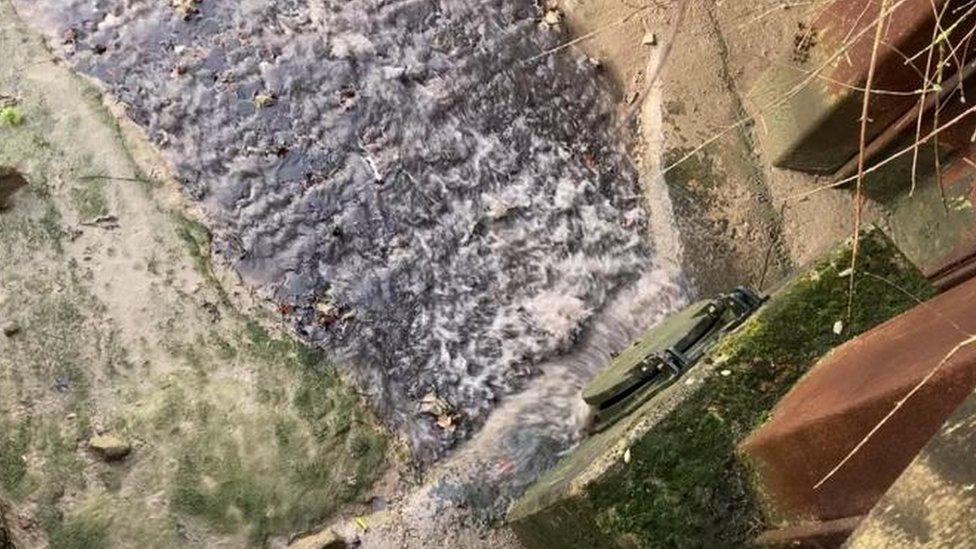
Storm overflows are a legacy of Victorian combined sewers - mixing waste water with rain runoff. In a downpour, sewage treatment works that cannot keep up are allowed to open the floodgates into rivers and seas to prevent sewers backing up into homes and businesses.
A House of Lords proposal to put a legal duty on water companies to reduce discharges was rejected by government ministers. But following pressure from peers and campaigners, the government put forward its own alternative.
Southern Water, which treats waste waster from two million homes stretching from Hampshire to Kent, recognises times are changing. It has pledged to cut the use of so-called storm overflows by 80% by 2030.
But the company also believes it is only one part of the puzzle. There are other sources of pollution - like domestic septic tanks and agricultural slurry - that must also be addressed to improve water quality, it says.
It also believes part of the solution is up stream, and above ground. Investing in "nature-based" solutions - like restoring wetlands and woodland - could help to reduce the amount of water tumbling down the drain in the first place.
Katy Taylor, chief customer officer at Southern Water, said the company would look into the BBC's findings to "try and understand whether there is anything around those outflows that we can do to improve or that we think might be a problem".
She said that water quality of coastal bathing waters had improved in the past two decades - 78 of the 83 sites in Southern Water's patch are now rated "good" or "excellent".
The company would support government if it decided to change laws to ensure rivers met the same standards, Ms Taylor added.
She said: "It will require a change in how rivers are treated that will ultimately cost money and there's something here around deciding who is going to pay for changing that. Is it going to be our customers or the wider public and taxpayers?"
For Susan, discovering the extent of sewage pollution was "utterly shocking", but she has vowed to continue swimming due to the benefits on her mental health.
"I would love to see clean water for everybody so we can enjoy this beautiful natural resource that's right next to us," she said.

Follow BBC South East on Facebook, external, on Twitter, external, and on Instagram, external. Send your story ideas to southeasttoday@bbc.co.uk.
Related topics
- Published25 November 2021
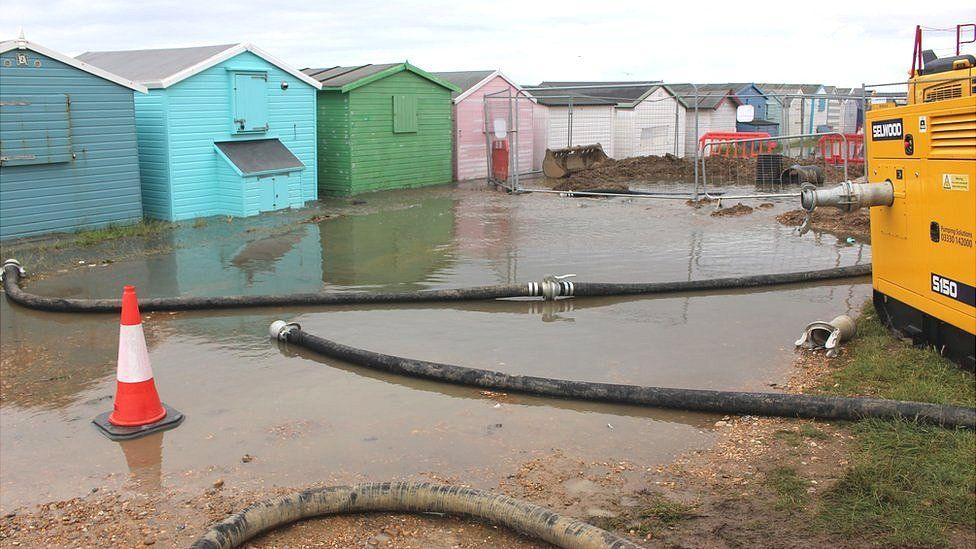
- Published30 October 2021
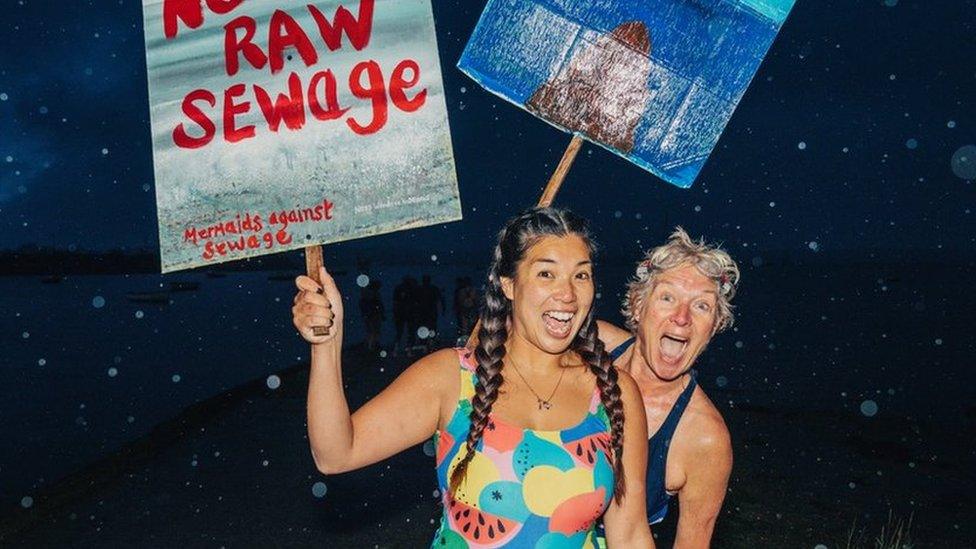
- Published27 November 2021
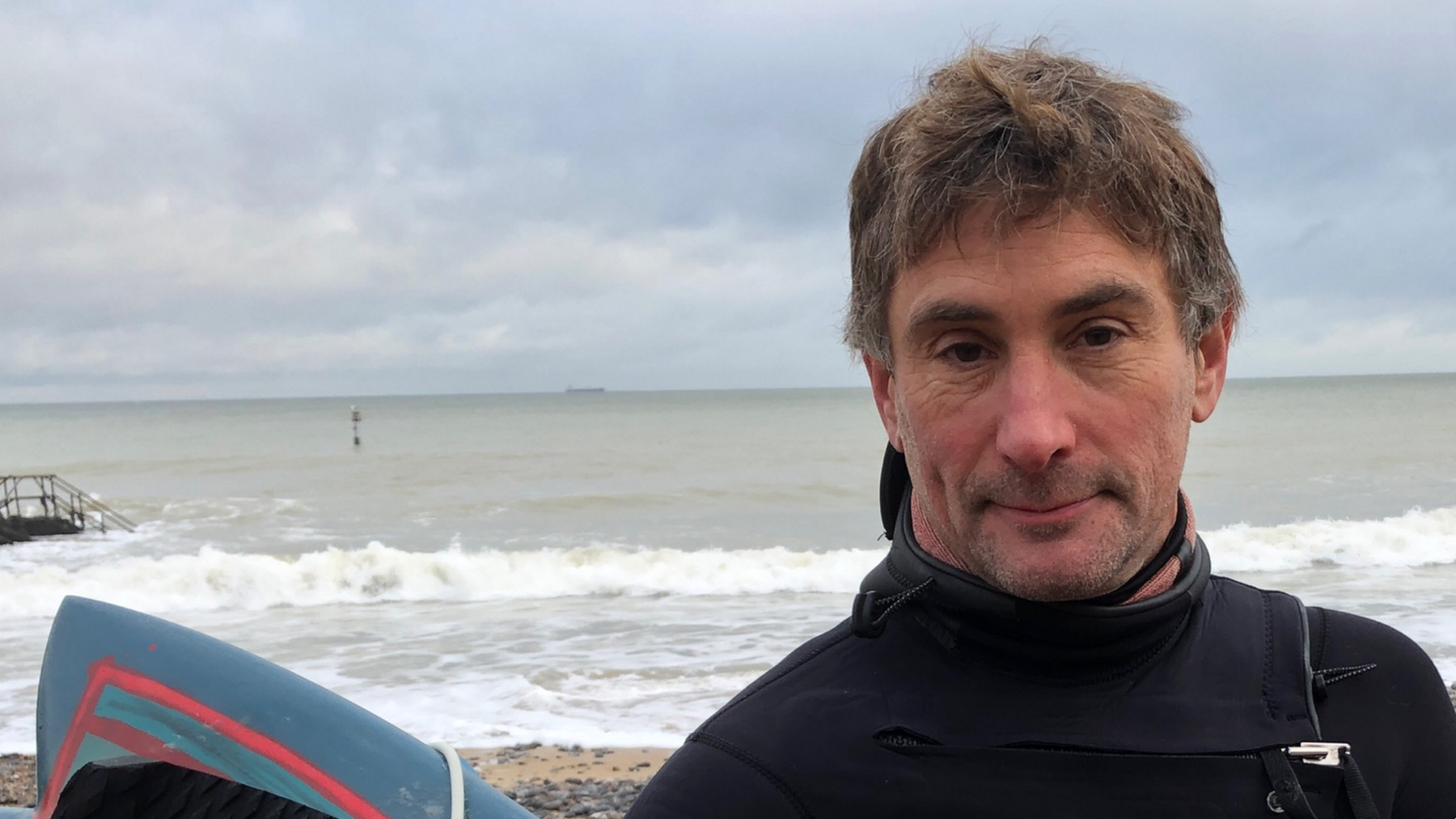
- Published23 September 2021
